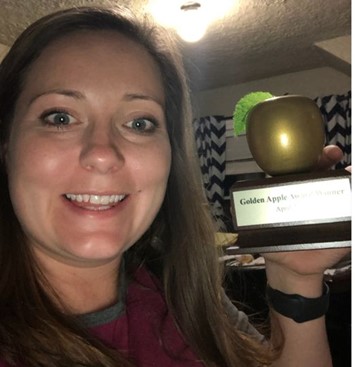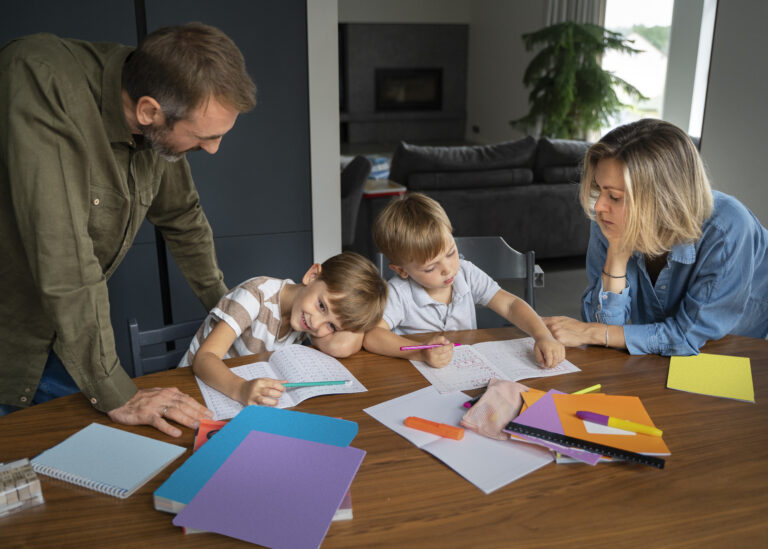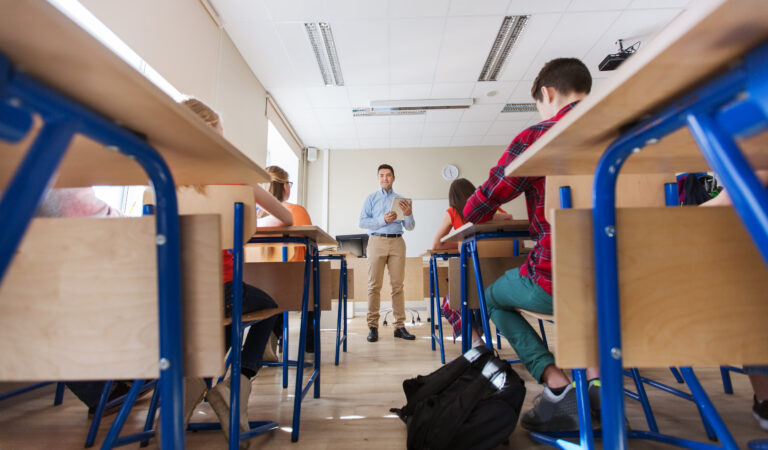Puberty educators are not born; they are made. This Educator Spotlight features Kathleen Bunker.
Ms. Kathleen Bunker teaches in a grade 4 classroom in Michigan. In fact, she is the teacher everyone loves. Parents in her school nominated her for an award, which she received. The Rotary Club presented her with the CFX Golden Apple Award for being an exemplary educator. Students also love her. In fact, one of her former students, now a senior in high school, recently returned to present her with a jersey in recognition of the impact she made on his life.

Kathleen’s passion for teaching includes bringing puberty education to everyone. She is on her school district’s Sex Education Advisory Board which is responsible for reviewing sex education curriculum for K-12 students. Their recommendations go to the school board for adoption. Kathleen fights for puberty education that is contemporary and relevant for today’s youth.
Part of what motivates Kathleen is her experience getting sex education in a private religious school; it didn’t meet student needs. Students are in a changing world, and it is hard to grow up and feel like they are not seen. Kathleen feels empathy for the people in her life who don’t “fit the mold” imposed by society’s expectations and stereotypes, such as the girl who wants to play football or the boy who wears nail polish. Because of this, she wants all students to feel seen and heard.
Normalizing Conversations
One of the things Kathleen likes the most about teaching puberty education is to normalize talking about it. She believes it’s like learning about any topic. During the first puberty lesson, kids are so nervous, but by the second or third lesson, they are asking questions and really into it. When she gets to the anatomy lesson, the kids are not afraid to speak up. She believes everyone needs to know about everyone. Keeping boys and girls separate just creates an aura of secrecy around topics that all students are dealing with.
Students feel totally comfortable in school with Kathleen’s modeling, but some go to homes where it is not okay to talk about it comfortably. She wants to be that safe person for them. Whereas puberty was a taboo topic, not to be talked about, now she tries to normalize it. Her goal is to make it okay, so they can talk with their own kids someday.
Challenges
One of the challenges Kathleen faces is not being able to answer all their questions due to school restrictions. The internet is full of misinformation and negative messages. When trusted adults can’t answer students’ questions, they will go to the internet to find answers and possibly get into information that isn’t helpful to them. Also, if adults don’t talk about puberty and body changes, kids think they can’t talk to adults when something bad happens. Then, they get hurt.
Another challenge is that the school’s puberty curriculum is limited by the religious beliefs held by some. Puberty and the changes in bodies are directly related to anatomy, gender identity, and sexual orientation. Yet, when we only teach about puberty for kids who are straight, it can communicate to some kids that they are not normal.
It is also challenging when things are accepted as normal across the generations. This often results in them not being discussed…resulting in harm to children.
Solutions
Some teachers are uncomfortable teaching puberty education, so Kathleen does team teaching with them to provide support and modeling. She has noticed that teachers sometimes struggle with teaching the anatomy of the reproductive system. This is from generational patterns of stigma that we are working to break. Kathleen supports other teachers to ensure that the curriculum is taught the way it’s intended.
Wishes for Kids
When I asked Kathleen what her wishes are for kids who are going through puberty, she replied:
- I don’t want kids to accept as normal so many harmful things that are happening to and around them.
- I’d like kids to know that changes they experience are normal. She wants them to hear, “It isn’t easy, but you can do it. You will get through it and can help others, too.”
- I wish kids could see themselves in the future and know that they are “normal.” Everyone is changing in their own unique way.
Más información
To read more Educator Spotlights, start with the Introduction.



